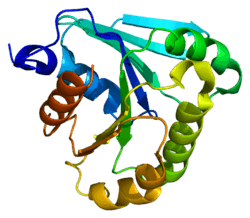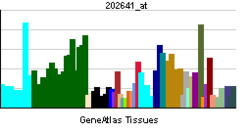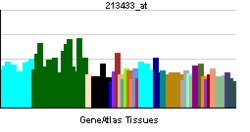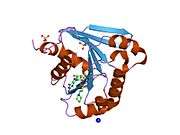ARL3
| View/Edit Human | View/Edit Mouse |
ADP-ribosylation factor-like protein 3 is a protein that in humans is encoded by the ARL3 gene.[3][4][5]
Function
ADP-ribosylation factor-like 3 is a member of the ADP-ribosylation factor family of GTP-binding proteins. ARL3 binds guanine nucleotides but lacks ADP-ribosylation factor activity.[5]
Interactions
ARL3 has been shown to interact with Protein unc-119 homolog.[6][7]
References
- ↑ "Human PubMed Reference:".
- ↑ "Mouse PubMed Reference:".
- ↑ Cavenagh MM, Breiner M, Schurmann A, Rosenwald AG, Terui T, Zhang C, Randazzo PA, Adams M, Joost HG, Kahn RA (August 1994). "ADP-ribosylation factor (ARF)-like 3, a new member of the ARF family of GTP-binding proteins cloned from human and rat tissues". J. Biol. Chem. 269 (29): 18937–42. PMID 8034651.
- ↑ Kim HS (March 1999). "Assignment of the human ADP-ribosylation factor-like 3 (ARL3) gene to chromosome 10 band q23.3 by radiation hybrid mapping". Cytogenet. Cell Genet. 83 (3-4): 246. doi:10.1159/000015194. PMID 10072593. Check date values in:
|year= / |date= mismatch(help) - 1 2 "Entrez Gene: ARL3 ADP-ribosylation factor-like 3".
- ↑ Stelzl U, Worm U, Lalowski M, Haenig C, Brembeck FH, Goehler H, Stroedicke M, Zenkner M, Schoenherr A, Koeppen S, Timm J, Mintzlaff S, Abraham C, Bock N, Kietzmann S, Goedde A, Toksöz E, Droege A, Krobitsch S, Korn B, Birchmeier W, Lehrach H, Wanker EE (September 2005). "A human protein-protein interaction network: a resource for annotating the proteome". Cell. 122 (6): 957–68. doi:10.1016/j.cell.2005.08.029. PMID 16169070.
- ↑ Van Valkenburgh H, Shern JF, Sharer JD, Zhu X, Kahn RA (June 2001). "ADP-ribosylation factors (ARFs) and ARF-like 1 (ARL1) have both specific and shared effectors: characterizing ARL1-binding proteins". J. Biol. Chem. 276 (25): 22826–37. doi:10.1074/jbc.M102359200. PMID 11303027.
Further reading
- Adams MD, Kerlavage AR, Fleischmann RD, Fuldner RA, Bult CJ, Lee NH, Kirkness EF, Weinstock KG, Gocayne JD, White O (1995). "Initial assessment of human gene diversity and expression patterns based upon 83 million nucleotides of cDNA sequence" (PDF). Nature. 377 (6547 Suppl): 3–174. PMID 7566098.
- Andersson B, Wentland MA, Ricafrente JY, Liu W, Gibbs RA (1996). "A "double adaptor" method for improved shotgun library construction". Anal. Biochem. 236 (1): 107–13. doi:10.1006/abio.1996.0138. PMID 8619474.
- Yu W, Andersson B, Worley KC, Muzny DM, Ding Y, Liu W, Ricafrente JY, Wentland MA, Lennon G, Gibbs RA (1997). "Large-scale concatenation cDNA sequencing". Genome Res. 7 (4): 353–8. doi:10.1101/gr.7.4.353. PMC 139146
 . PMID 9110174.
. PMID 9110174. - Linari M, Hanzal-Bayer M, Becker J (1999). "The delta subunit of rod specific cyclic GMP phosphodiesterase, PDE delta, interacts with the Arf-like protein Arl3 in a GTP specific manner". FEBS Lett. 458 (1): 55–9. doi:10.1016/S0014-5793(99)01117-5. PMID 10518933.
- Hillig RC, Hanzal-Bayer M, Linari M, Becker J, Wittinghofer A, Renault L (2000). "Structural and biochemical properties show ARL3-GDP as a distinct GTP binding protein". Structure. 8 (12): 1239–45. doi:10.1016/S0969-2126(00)00531-1. PMID 11188688.
- Van Valkenburgh H, Shern JF, Sharer JD, Zhu X, Kahn RA (2001). "ADP-ribosylation factors (ARFs) and ARF-like 1 (ARL1) have both specific and shared effectors: characterizing ARL1-binding proteins". J. Biol. Chem. 276 (25): 22826–37. doi:10.1074/jbc.M102359200. PMID 11303027.
- Bartolini F, Bhamidipati A, Thomas S, Schwahn U, Lewis SA, Cowan NJ (2002). "Functional overlap between retinitis pigmentosa 2 protein and the tubulin-specific chaperone cofactor C". J. Biol. Chem. 277 (17): 14629–34. doi:10.1074/jbc.M200128200. PMID 11847227.
- Hanzal-Bayer M, Renault L, Roversi P, Wittinghofer A, Hillig RC (2002). "The complex of Arl2-GTP and PDE delta: from structure to function". EMBO J. 21 (9): 2095–106. doi:10.1093/emboj/21.9.2095. PMC 125981
 . PMID 11980706.
. PMID 11980706. - Wistow G, Bernstein SL, Wyatt MK, Ray S, Behal A, Touchman JW, Bouffard G, Smith D, Peterson K (2002). "Expressed sequence tag analysis of human retina for the NEIBank Project: retbindin, an abundant, novel retinal cDNA and alternative splicing of other retina-preferred gene transcripts". Mol. Vis. 8: 196–204. PMID 12107411.
- Grayson C, Bartolini F, Chapple JP, Willison KR, Bhamidipati A, Lewis SA, Luthert PJ, Hardcastle AJ, Cowan NJ, Cheetham ME (2002). "Localization in the human retina of the X-linked retinitis pigmentosa protein RP2, its homologue cofactor C and the RP2 interacting protein Arl3". Hum. Mol. Genet. 11 (24): 3065–74. doi:10.1093/hmg/11.24.3065. PMID 12417528.
- Stelzl U, Worm U, Lalowski M, Haenig C, Brembeck FH, Goehler H, Stroedicke M, Zenkner M, Schoenherr A, Koeppen S, Timm J, Mintzlaff S, Abraham C, Bock N, Kietzmann S, Goedde A, Toksöz E, Droege A, Krobitsch S, Korn B, Birchmeier W, Lehrach H, Wanker EE (2005). "A human protein-protein interaction network: a resource for annotating the proteome". Cell. 122 (6): 957–68. doi:10.1016/j.cell.2005.08.029. PMID 16169070.
- Kühnel K, Veltel S, Schlichting I, Wittinghofer A (2006). "Crystal structure of the human retinitis pigmentosa 2 protein and its interaction with Arl3". Structure. 14 (2): 367–78. doi:10.1016/j.str.2005.11.008. PMID 16472755.
- Zhou C, Cunningham L, Marcus AI, Li Y, Kahn RA (2006). "Arl2 and Arl3 regulate different microtubule-dependent processes". Mol. Biol. Cell. 17 (5): 2476–87. doi:10.1091/mbc.E05-10-0929. PMC 1446103
 . PMID 16525022.
. PMID 16525022.
This article is issued from Wikipedia - version of the 5/19/2016. The text is available under the Creative Commons Attribution/Share Alike but additional terms may apply for the media files.



